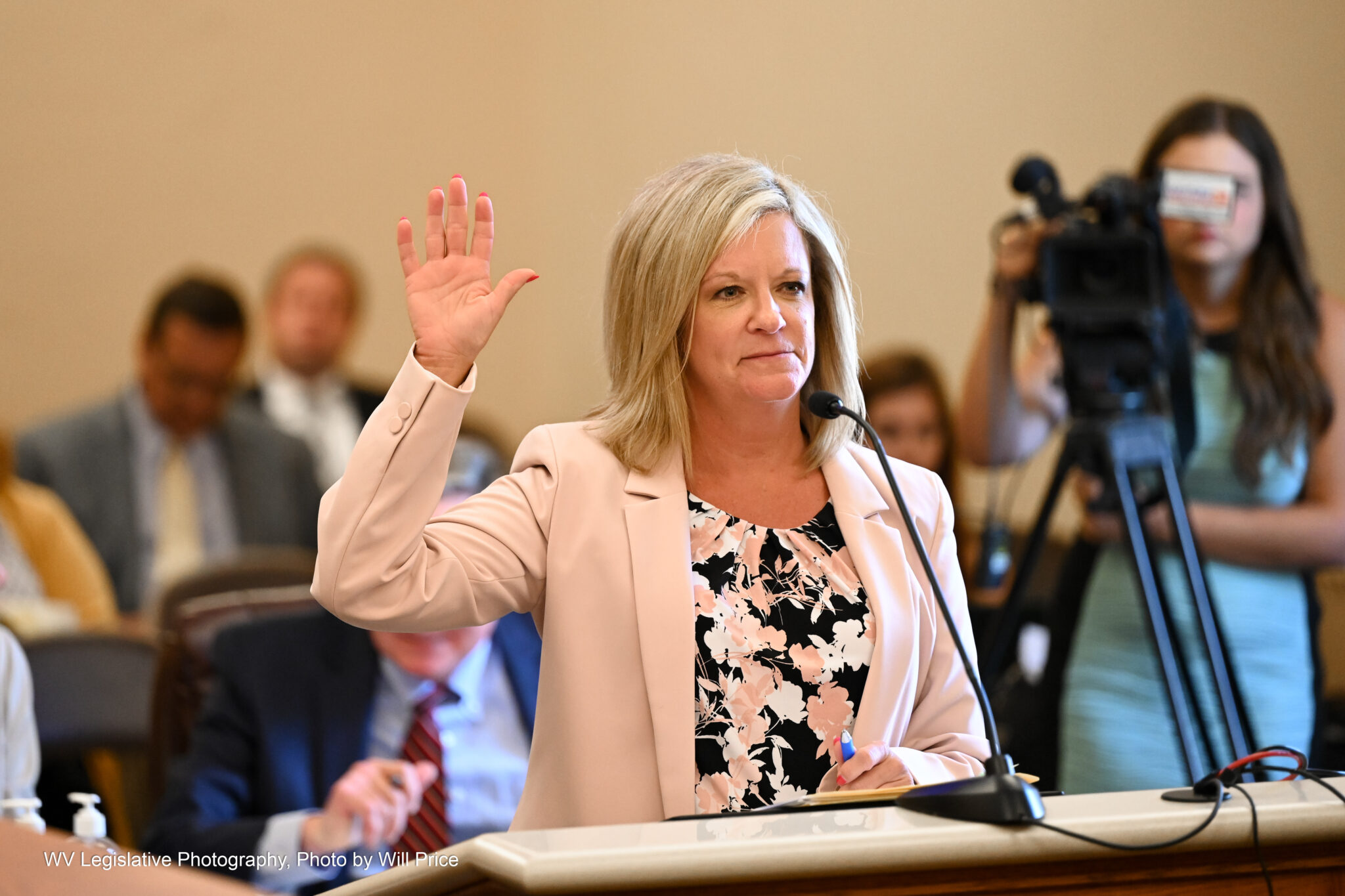Photo caption: State schools Superintendent Michele Blatt told lawmakers in the Education Oversight Commission on Education Accountability on Monday that schools have lost 41% of their special education aides to the first grade classrooms. (Will Price | West Virginia Legislative Photography)
The Third Grade Success Act, this year’s landmark education bill, drained staff from special education classrooms in order to fill the new aide roles, which pay better.
BY: AMELIA FERRELL KNISELY – SEPTEMBER 13, 2023 6:00 AM
The Third Grade Success Act, this year’s landmark education bill, is having unintended consequences on staffing special education classrooms, where students regularly need help eating, going to the bathroom and staying safe.
The bill this year requires specially-trained aides in many first-grade classrooms in an effort to boost low reading and math scores.
“We’ve lost 41% of our special education aides to the first grade classrooms,” state schools Superintendent Michele Blatt told lawmakers in the Education Oversight Commission on Education Accountability on Monday.
Forty-eight of 55 counties reported their data, showing that 249 aides had moved into the new positions, Blatt said.
In response, Sen. Amy Grady, who is a public school teacher, said working in a special education classroom is much harder. The work requires responding to regular behavioral disruptions, including outbursts.
The job pays less than the new first-grade classroom aides positions, too.
“We need to find a way to entice [aides] to stay in those harder positions,” said Grady, R-Mason.
Lawmakers, trying to address the state’s abysmal reading and math rates, earlier this year passed a landmark education reform bill, The Third Grade Success Act. It was packed with a number of initiatives aimed at early intervention and providing additional support for young students, including putting classroom aides in many lower-level classrooms.
Lawmakers have already expressed concerns that the bill would inadvertently cause a staffing crisis in special education classrooms. They thought they’d need around 2,000 new aides under the bill’s requirements, where classroom size determines the need for an aide.
While the state was largely able to fill the new positions for this school year in first grade classrooms — second and third grade aides will be added in the coming years — it did end up causing vacancies in special education classrooms, which still persist.
“We do still have some shortages,” Blatt said, but she was unable to share an exact number of unfilled positions at the time.
“We don’t have information on that yet,” she said.
She told lawmakers that many of the newly-vacated special education positions had been filled by newcomers who wanted to work in the school system.
Del. Sean Hornbuckle, D-Cabell, questioned if the new people filling the vacant special education aide positions statewide were “adequately trained.”
Blatt responded that they were trained as an aide. The state doesn’t require a different certification for aides in special education.
In Kanawha County, the state’s largest district, 10 special education aides shifted into the new classroom aide positions, according to schools spokesperson Briana Warner.
The school district still has 10 vacant special education aide positions. “This is not atypical for us,” Warner noted.
She said Kanawha County Schools is using substitutes to fill the vacant aide positions while they await full-time applicants.
The district tried to get ahead of any additional aide vacancies by offering to move aides funded by dwindling federal pandemic relief dollars into special education classrooms or into the new aide positions.
There is no penalty for school districts that fail to hire enough aides.
Ahead of the Third Grade Success Act going into effect, data from last school year showed slight gains in student math, reading and other test scores. The scores were still behind where students were before the COVID-19 pandemic.
Historically, West Virginia has struggled with education outcomes amid the state’s poverty rate. The pandemic, which first affected students in the spring of 2020, exacerbated poor performance due to learning disruptions and increased mental health struggles.
** West Virginia Watch is a nonprofit media source. Articles are shared under creative commons license. Please visit https://westvirginiawatch.com/ for more independent Mountain State news coverage.

